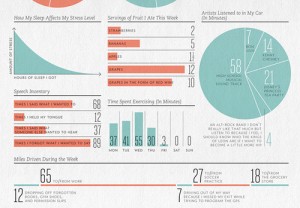The Economic Value of (Very) Personal Data
 Photo: moonape
Photo: moonapeGraphic designer Nicholas Felton keeps track of how many miles he walks each day. He also records how many book pages he reads, how many work e-mails he sends, and what songs he listens to. Felton’s become somewhat famous for his obsessive self-tracking, and the slick info-graphics he produces on himself each year. Both the Wall Street Journal and Slate have made videos about him, here and here.
Felton began tracking his daily habits and compiling a Personal Annual Report in 2005, available at his website. These are singularly well-designed windows into a well-examined life, and obsessive-compulsive disorder has never looked so winning. Reflecting on the popularity of his annual reports, Felton says, “[T]he stories I examine are something [people] can reflect upon, and how they relate to their life.”
Personal Annual Reports paved the way for Daytum.com, a website that in its own words “helps you collect, categorize and communicate your everyday data.” And so now we can track our minutiae and try to make sense of it all. “What’s exciting,” writes Dominic Basulto in an article for Big Think, “(and simultaneously scary at the same time) is that people are finally realizing that all of this data that we are accumulating about our bodies and our lives has economic value. We own this data and have the right to share it with whomever we please.”
Self-realization, it seems, has a price like everything else. Moreover, it’s just one short step away from group realization, which will have a much higher price if advertising and marketing have anything to say about it.
But who, then, will control all the data?
And, if there’s really a hacking epidemic going on, will Fitbit be next?

Comments